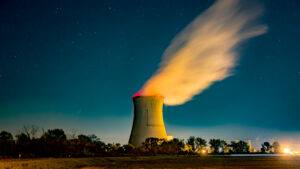ASX Green Energy Stocks: AGL gets green light for big battery at Liddell coal site

Pic: Getty Images
- AGL granted approval for 2GWh grid-scale battery at Liddel Power Station
- LM Wind Power, a GE renewable energy business produces prototype of 100% recyclable wind turbine blade
- PH2 partners with JJ Waste to build Australia’s first hydrogen fuelled garbage truck
AGL Energy’s (ASX:AGL) proposed 500-megawatt, two gigawatt-hour (GWh) grid-scale battery on the site of its Liddell power station has been granted approval by the NSW Department of Planning and Environment (DPE).
The grid-scale battery will form part of AGL’s Hunter Energy Hub that is planned for the site of Liddell power station, following its retirement in 2023.
AGL Chief Operating Officer, Markus Brokhof said the transition of Liddell power station into an integrated, low-carbon industrial energy hub would be AGL’s first rehabilitation of a thermal coal site.
“As we decarbonise, firming technology like this grid-scale battery will become the backbone of the NEM helping to support reliable supply for households and businesses,” Mr Brokhof said.
He said the planning approval marks a significant milestone for the transition of the Liddell site and looks forward to working with partners to progress other developments such as a wind farm, a solar storage system, pumped hydro, a waste-to-energy plant and its green hydrogen pilot with Fortescue Future Industries (FFI).
“All of these developments will benefit from the excellent resources and infrastructure these sites feature and create the jobs of the future across many industries, not just energy.
“This is a trend that is already happening overseas with more than 150 energy hub projects announced globally, all of them aimed at creating new business development opportunities and value creation.
“As Australia moves forward and we increase our reliance on renewable generation, batteries will be critical in providing the storage needed to maintain a consistent, reliable and affordable energy system.
GE renewable energy business readies first recyclable wind turbine prototype
LM Wind Power has made a significant step forward on the industry’s transition to a circular economy with the production of the first prototype of its 100% recyclable wind turbine blade as part of the the ZEBRA (Zero wastE Blade ReseArch) project – a partnership led by French research center IRT Jules Verne and brings together industrial companies including Arkema, CANOE, Engie, LM Wind Power, Owens Corning and SUEZ.
The 62m blade was made by LM Wind Power at its Ponferrada plant in Spain., using Arkema’s Elium resin, which is a thermoplastic resin well known for its recyclable properties together with the new high performance glass fabrics from Owens Corning.
This milestone is achieved after a year of material development and testing backed by sub-component level process trials by the consortium partners.
Next steps include the recycling of production waste, the dismantling and recycling of this first blade and the analysis of the test results.
By the end of the project in 2023, the consortium will have met the challenge of bringing the wind energy sector into the circular economy loop in a sustainable manner, according to the principles of eco-design.
Pure Hydrogen to develop Australia’s first hydrogen fuelled garbage truck
East coast clean energy company Pure Hydrogen Corporation (ASX:PH2) has partnered with domestic waste collection provider JJ’s Waste and Recycling to trial Australia’s first hydrogen fuelled garbage truck.
The binding term sheet sees the parties enter a wet hire lease agreement with Pure Hydrogen supplying the hydrogen fuelled garbage truck, hydrogen and refuelling services.
In a market announcement this morning, PH2 said the two entities will undertake a trial program with the first vehicle to determine the effectiveness of the partnering arrangement under the term sheet.
The trial will begin later this year with the first truck based on the Gold Coast and set to hit the suburbs of southeast Queensland.
JJ’s Waste has more than 2,000 trucks in its fleet and if the trial is successful, there is potential for further hydrogen fuelled trucks to be transitioned into the Company’s fleet to reduce their carbon footprint.
JJ Waste national fleet manager Owen Burton said with vehicle technology rapidly changing, the company wants to be able to offer its council customers the latest in environmentally friendly vehicle options whilst ensuring maximum safety and reliability.
“We feel it is important to assist in the development of these technologies by partnering with companies such as Pure Hydrogen to conduct vehicle trials and we look forward to seeing the results later this year,” he said.
Pure Hydrogen managing director Scott Brown said PH2 believes this is the start of a “new era for heavy commercial vehicles” in Australia which will not only reduce and fix fuel costs but be cleaner and greener for the Australian environment.
Related Topics
UNLOCK INSIGHTS
Discover the untold stories of emerging ASX stocks.
Daily news and expert analysis, it's free to subscribe.
By proceeding, you confirm you understand that we handle personal information in accordance with our Privacy Policy.








